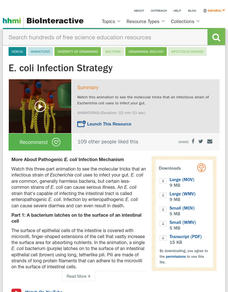Crash Course Kids
Fixing Failure Points
How do engineers find and fix failure points in a solution they're trying to develop? This is the driving question of an informative and entertaining video. Here, future engineers discover why it is important to fail when...
Crash Course Kids
Succeed by Failing
"If at first you don't succeed, try, try again." This statement has never rung truer than when engineers are testing solutions. Here is an informative video that focuses on the failure point which engineers often face when...
Crash Course Kids
Designing a Trial
Watch the video to gain insight into an intriguing combination of the engineering process and a game of ring toss. Viewers examine the activity through the eyes of the engineers that first set the criteria for a successful outcome....
Crash Course Kids
Testing and Trials
What do engineers do if they don't have what they need to make a solution work? They keep on testing! Here is a video that gives individuals insight into the process taken by engineers when they find themselves without the...
TED-Ed
How does anesthesia work?
Many people know the feeling of counting backward from 100 before a surgical procedure begins, but what actually happens between number 99 and waking up after surgery? Watch a short video about the different types of anesthesia, the...
TED-Ed
How Do Solar Panels Work?
What are those shiny things that people are installing on the roofs of their houses? Learn about the structure, function, and logistics of solar panels, as well as the challenges of using the sun's energy as our exclusive power source on...
Get Chemistry Help
Chemistry Lesson: Unit Analysis (Unit Conversions)
An informative video offers detailed instruction of the proper way to convert between different units in the English and metric systems. Additionally, it provides an explanation of how to handle significant digits and when this...
Get Chemistry Help
Chemistry Lesson: Balancing Chemical Equations
An informative video segment describes how to balance chemical equations. It ensures pupils will obey the laws of conservation of mass and shares tips to assist young chemists who may need additional help to ensure a more simplistic...
Crash Course
Copyright, Exceptions, and Fair Use
Why have courts declared the Fair Use clause the most troublesome in copyright law? Does this clause mean that teachers can use copyrighted materials for educational purposes? What are the exceptions to copyright enforcement? Find...
Howard Hughes Medical Institute
Seeing Single Molecules Move
Seeing is believing! Viewers observe the latest in technology—the ability to watch as a protein molecule searches for the appropriate binding site on a DNA molecule! A short video follows transcription factors SOX2 and OCT4 in their...
Howard Hughes Medical Institute
Shotgun Sequencing
Finally, something that is better when it's broken! Computers make sequencing short pieces of genome an easy task, yet they struggle with long sequences. Learn about one method for sequencing genomes by breaking it into smaller pieces...
Crash Course
Engineering Ethics: Crash Course Engineering #27
It's important to do the right thing. An engaging video describes each of the eight tenets of the Engineering Code of Ethics. It then discusses the concepts of utilitarianism, rights ethics, and duty ethics. The video also looks at...
TED-Ed
Epic Engineering: Building the Brooklyn Bridge
Sometimes bridge building is a family business. An enlightening video describes the construction of the Brooklyn Bridge and the engineering principles behind suspension bridges. Viewers also learn about the people who led the project,...
Crash Course Kids
What's an Engineer?
What is an engineer? Find out in a brief video that explores types of engineers and the three essential questions every engineer asks and answers. Additionally, pupils discover real world engineers that have made an impact on...
Curated OER
Factor by Grouping And Factoring Completely
Useful as a classroom resource, a computer lab assignment, or even a homework supplement, this video shows viewers some more techniques for factoring polynomials. Once they have mastered the art of factoring, the rest of algebra will...
TED-Ed
A Call to Invention: DIY Speaker Edition
Can you build a homemade speaker out of a potato chip? Bestselling author and do-it-yourself expert William Gurstelle shows you how in his brief presentation at TEDYouth 2012. He encourages young people to be creative and explore...
Deep Look
This Pulsating Slime Mold Comes in Peace (ft. It's Okay to Be Smart)
Can you name an organism that isn't a plant, animal, or fungus? Here's a hint: each cell contains thousands of nuclei. Slime mold may not have any appendages, but their movements fascinate scientists. The video focuses on these unique...
Periodic Videos
Manganese
Photosynthesis requires manganese as an essential element. The 25th video occurs as part of a larger playlist of 118 on chemical elements. It discusses manganese and many interesting properties due to its position in the middle of the...
California Academy of Science
Renewable Energy: Clean Tech Solutions
Renewable energy originally found application more than 790,000 years ago. A relevant and engaging lesson explains some of the current options for renewable energy. Technology changes quickly and many different options provide hope for...
Howard Hughes Medical Institute
Somatic Cell Nuclear Transfer Animation
One cloning technique is somatic cell nuclear transfer (SCNT). Observe the process in action through an animated video. Review the applications of the process for both therapeutic cloning and cloning of an individual.
California Academy of Science
Your Digital Footprint: Data and Energy Use
Understanding energy usage requires knowing more than how much energy it takes to charge your cell phone. Scholars learn each text sent uses energy as does each video, game, and phone call. They observe the larger grid of data transfers...
Curated OER
The Power of the Docs
While learning to code is fairly interesting academic pursuit in it's own right, it also has other learning benefits. For one, coders learn to how to learn. They are continually exploring, testing, and drawing conclusions about how...
Khan Academy
What is Inside a Tap Light?
Turning on a tap light requires just a tap, but breaking it apart requires a bit more work. Viewers watch as the narrator breaks a tap light apart into its component parts. The video explains the purpose of each part and how the tap...
Howard Hughes Medical Institute
E. Coli Infection Strategy
While most strains of E. coli exist harmlessly inside our digestive tracts, some strains cause serious illness and even death. Watch the infection strategy of E. coli as it attacks a cell. The animation shares both what happens inside...
Other popular searches
- Technology in the Classroom
- Classroom Technology Videos
- Classroom Technology Themes
- For Technology in Classroom
- \"Technology in the Classroom\

























